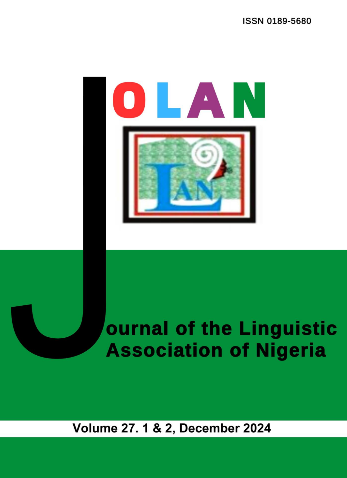Communicating Agricultural Research to Farmers in Rural Areas in Nigeria: Key to National Development
Keywords:
Agricultural research, Communication strategy, development, extension service, Indigenous language and rural farmersAbstract
Pervasive underdevelopment keeps characterizing our society while sponsorship for Agricultural researches is on the increase. Most communities in Nigeria are agrarian with rural farmers who have little or no access to modern technology nor can communicate in any language other than their indigenous languages. The objective of this study is to investigate the impact of the use of indigenous language as an appropriate mode of communication, in the dissemination of Agricultural research findings on the development of the knowledge of the rural farmers. The study used the instruments of questionnaire and semi-structured interview to elicit information from the sample population which consists of 107 Agricultural researchers and Extension Officers in the Root Crops Institute and Michael Okpara University of Agriculture both in Umudike, Abia State, Nigeria, and focus groups of 200 rural farmers from the institutions’ host communities. The data generated from the questionnaire were analysed using mean simple equation and represented on a pie chart. The result shows that greater percent of the rural farmers are left in the dark of most of the scientific findings due to failure to communicate them using the appropriate language. The study therefore, concludes that there will be no meaningful development in a nation if the rural farmers who should provide food for the nation’s teeming population, fail to access the right information for the development of their farming system.
References
Age, A.I.; Obinne C.P.O.; Demenogu, T.S. (2012). Communiucation for sustainable rural development in Benue State, Nigeria. Sustainable Agriculture Research. Vol. 1 (1), 118-129.
Adediji, O. (1992). Emerging trends in Nigeria local government. Ibadan: Adefila Commercial Printers.
Akpabio, E. (2003). African communication systems: An introductory text. Lagos: B Print Publications.
Bachman, L.F. (1990). Fundamental consideration in language testing. Oxford: Oxford University Press.
Bell, R.T. (1981). An introduction to applied linguistics: Approaches and methods in language teaching. London: B.T. Batsford.
Canale, M. & Swain M. (1980). Theoretical bases of communicative approaches to second language teaching and testing. Applied Linguistics, 1(1), 1-47.
Dalton, G. (1970). The Economic System. A Handbook of method in Cultural Anthropology, R. Narrel and B.J. Cohen, (eds.). New York: Columbia University Press.
Food and Agriculture Organization of United Nations, (2006). Effective rural communication for development.
Hymes, D. (1970). On communicative competence. In J. Gumperz and D. Hymes (eds.) Directions in sociolinguistics: The ethnography of communication. 269-93. New York: Holt, Rinehart & Winston.
Lado, R. (1964). Language teaching: A scientific approach. New York: McGraw Inc.
Lewis, C. & Aarts, N. (2011). Rethinking communication in innovation process: Creating space for change in complex systems. The Journal of Agricultural Education and Extension. Vol.17 (1), 21-36.
Mchonu, K. (2003). Case studies: Impact of information to rural development: Background, methodology and progress. In M. Kamba (ed.), Access to information: The dilemma for rural community development in Nigeria. Retrieved from www.goggles.com March10, 2019.
Niggusie, H. (2017). Indigenous communication forms and their potential to convey food security messages in rural Ethiopia. Http:/doi.org10.117709737030176998895.
Nwachukwu, I. (2017). Agricultural communication: Principles and practice. Umuahia: SCCDR Publishers.
Nwachukwu, I. (July, 2019). Interview. Directorate of Agricultural Reseach Extension Service, Michael Okpara University of Agriculture, Umudike, Abia state .
Nwosu, I.E. (1987). Research Training for Rural Development and Communication: Adopting the TriModular Training and Sequential Research Models. Africa Council on Communication Education. Jrica Media Review, Vol.1(2)
Nwosu, I.A. (2013). Indigenous communication as an enabling factor for rural development in Nigeria. International Journal of Development and Management review, Vol. 8 (1)
Obinne, C.P. (1992). Effective communication in agricultural extension. Productivity. Vol.33, pp. 309-316.
Ogueri, E.I. and Nnamdi, V. (2010). Sustainable rural development in Nigerian issues and facts. International Journal of Sustainable Development. Vol. 2 (3)
Okiyi, R.B. (2005). Using libraries as tools for education and national development in the 21st century. Information on Social Change. No. 21
Oko, O.L. (2017). English in developing nations’ indigenous language. Ndunode: Calabar Journal of the Humanities. Vol.12 (1). 184-193.
Olusoji, O.A. (2012). Eeffects of English language on national development. Greener Journal of Social Sciences. Vol. 2 (4), 134-139.
Oluikpe, B. & Oluikpe, E. (2014). Principles of second language development: Processing, theories and issues. Onitsha: Africana First Publishers.
Oyelaran, O.O. (1988). Language marginalization and national development in Nigeria. Ife Studies in English. Vol. 2 (1) 1-13
Ramos, A. & Empinotti, R. (2017). Indigenous languages must feature in science communication. Retrieved from www.google.com on https://mg.co.za/…/ March 31, 2019.
Rivera, W. & Sulaiman, R. (2009). Extension: Object of reform, engine for innovation. Outllook on Agriculture. Vol. 38 (3), 267-73.
Salawa, A. (2006). Indigenous language media: A veritable tool for African language learning. Journal of Multicultural Discourses. Vol. 1 (1).
Sinha, S. (2013). Science communication to expedite rural development: A case study. Global Media Journal. Vol. 4 (1), 1-10.
Soola, E.O. (2002). Development communication: The past, the present and the future. In Soola, E.O. (ed.). Communicating for development purposes. Ibadan; Kraft Books Ltd.
Tserdanelis, G. & Wong, Wai Peggy, (eds.), (2004). Language file: Materials for an introduction to language and linguistics. Columbus, Ohio: Department of Linguistics, Ohio State University.
Wilson, D. (1987). Traditional media in modern African development. African Media Review, Vol. 1 (2), 84-104














